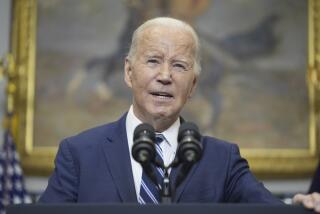Wisdom at Work
- Share via
The House of Representatives showed wisdom and courage on Thursday in voting down President Reagan’s request for $100 million in aid for anti-government rebels in Nicaragua, the contras. Now the 222-member majority that stalled the Administration’s covert war against the Sandinistas must make sure that Reagan does not undermine efforts by the Latin American allies to resolve the Central American crisis through negotiations.
It took courage for the House members, who are facing an election later this year, to resist the crude redbaiting and falsehoods that Reagan and his surrogates used to try to stampede the contra aid through Congress. For all of the President’s much-praised skills as a communicator, his televised speech on Nicaragua last Sunday apparently failed either to sway any members of Congress to his side or to persuade the American public that Nicaragua is the dire threat that he claims it is.
Reagan’s speech was so grossly exaggerated that the President’s arguments began to unravel almost immediately. Brazil angrily challenged Reagan’s statement that the Sandinistas are attempting to undermine its government. Jewish organizations disputed the President’s claim that the Sandinistas are anti-Semitic and harass Nicaragua’s small Jewish community. Even the President’s own Drug Enforcement Administration would not support Reagan’s claim that the Sandinista government’s leaders are involved in drug smuggling.
If nothing else, perhaps this defeat will persuade Administration spokesmen that when they debate Nicaragua with the many people who do not share Reagan’s simplistic view of the world, it is counterproductive to make outlandish charges that aren’t true and to question the patriotism of their opponents.
The House showed wisdom in listening to members of Congress who have studied the situation in Central America and understand that the United States has a better chance of achieving what it needs in the region--an end to political violence, more democracy and a rebuff to Soviet and Cuban adventurism--if we will only heed the counsel of friends in Latin America. Every major democracy south of the Rio Grande, from Mexico to Argentina, opposed the contra aid request and instead urged the Administration to give the Central American peace talks organized by the Contadora Group (Mexico, Colombia, Venezuela and Panama) a chance to work. The leaders of Latin America have no illusions about the Marxist leanings of Nicaragua’s revolutionary government, but they believe that diplomacy and economic and moral pressure are more likely than force of arms to contain the Sandinistas and prod them toward democracy.
The Administration has never given the Contadora process a chance to work, and has at times even tried to undermine it because of Reagan’s deep aversion to the Sandinistas. It would therefore be a serious mistake for Congress now to try to compromise with the Administration on a new contra aid proposal--as some hope to do on April 15, when House Speaker Thomas P. (Tip) O’Neill Jr. (D-Mass.) has said that other contra aid proposals can be considered. Reagan would take any congressional approval of aid to the contras as a stamp of approval for his attacks on Nicaragua.
The best hope for bringing peace to Central America in the short run, and more democracy in the long run, is to let the Contadora Group be about its important work without U.S. interference.
More to Read
Get the L.A. Times Politics newsletter
Deeply reported insights into legislation, politics and policy from Sacramento, Washington and beyond. In your inbox twice per week.
You may occasionally receive promotional content from the Los Angeles Times.










